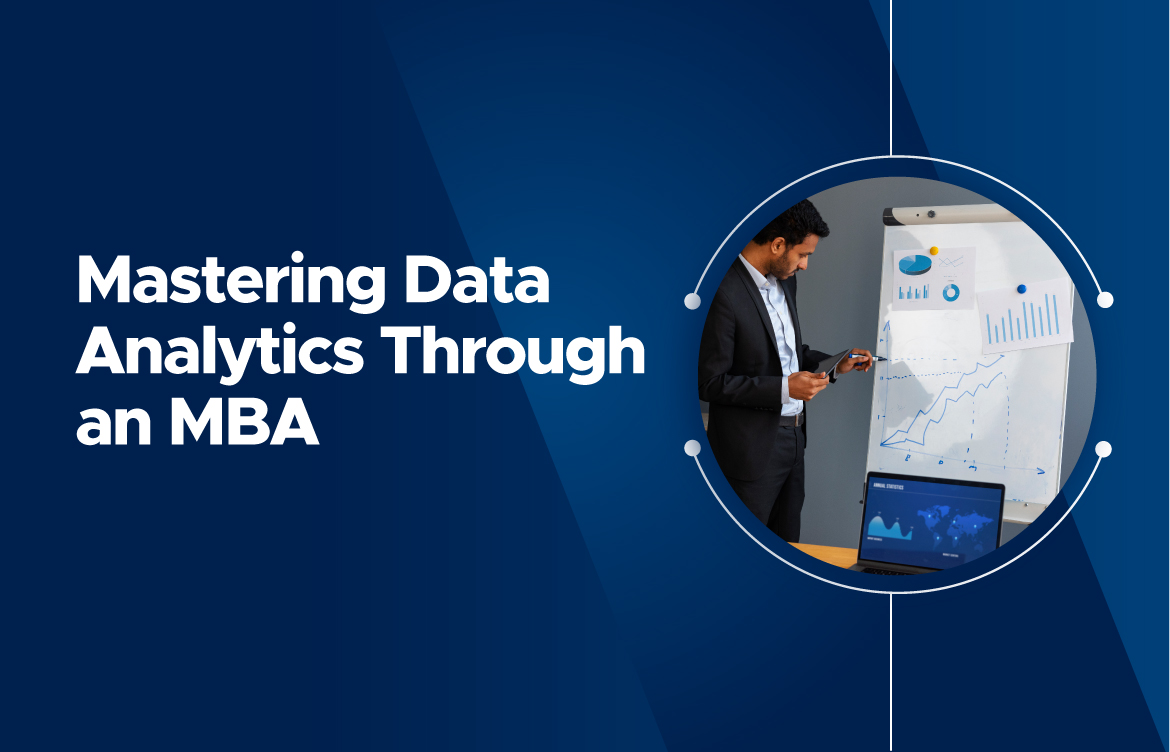Mastering The Art Of Data Analytics Through An MBA
Integrating data and technology has become essential in strategic decision-making. Businesses need experts in data analytics to get actionable insights as the amount and complexity of data increase. Aspiring data analysts might consider studying for an MBA with a focus on data analytics as one notable alternative. In response to this need, academic institutions offer MBA programs in data analytics.
MBA in Data Analytics: An Overview
Students enrolled in the specialized MBA program in data analytics will get advanced abilities in data analysis and interpretation in addition to a comprehensive understanding of business management fundamentals.
While most MBA schools focus primarily on business administration, this course delves further into predictive modeling and data science.
The graduates become flexible professionals by combining their technical expertise with commercial knowledge.
They are adept at negotiating the complexities of modern, data-driven businesses.
- Data Analytics Elements in MBA Programs
- Foundational Business Courses
- Core business courses covering subjects like finance and marketing are usually offered at the start of MBA programs with a data analytics concentration.
- These courses give students a strong foundation in business principles which is necessary to understand how data analytics fits in with company goals.
Quantitative Analysis
This is an essential part of any program involving data analytics
Students study statistical tools and mathematical modeling in order to gain relevant insights from data sets.
Professionals who have mastered these strategies can make informed decisions on evidence derived from data.
Data Mining and Machine Learning
In today’s data-rich world, the capacity to discover patterns and trends hidden in massive databases is essential.
MBA programs in data analytics frequently include courses in data mining and machine learning.
It prepares students to use algorithms and predictive models for predictive analysis and forecasting.
Data Visualization and Communication
Analyzing data is only half the battle; successfully communicating results to stakeholders is just as important.
MBA schools place a strong emphasis on the use of storytelling and data visualization approaches to communicate difficult results in an understandable and engaging way.
Graduates are trained to close the information gap between decision-makers and data through the creation of persuasive presentations and educational dashboards.
Business Intelligence and Strategy
Data analytics helps companies achieve their strategic goals by doing more than just crunching numbers.
MBA programs teach students the strategic thinking abilities required to align data projects with overall corporate goals.
Graduates are made ready to lead corporate success using data-driven tactics from finding growth possibilities to maximizing operational efficiency.
Career Opportunities in Data Analytics
Data Scientist
Gathering and analyzing vast amounts of data to support business choices is the responsibility of data scientists. Data Scientists make use of advanced statistical methods and programming languages like Python to gain insights and produce useful results.
Business Analyst
Business analysts serve as a link between business strategy and data analysis. They collaborate closely with stakeholders to understand business needs. They help in spotting the areas for development and providing data-driven solutions to solve problems faced by the company.
Data Engineer
Data engineers are in charge of developing and maintaining the infrastructure required for data analysis. To assist analytics projects, they create data pipelines and guarantee the quality of the data.
Consultant
Data analytics consultants offer strategic advice to firms looking to use data to gain a competitive advantage. They evaluate current procedures and make customized recommendations to promote the company’s growth and efficiency.
Risk Analyst
Risk analysts assess the possible threats and opportunities inside the organizations by examining the company’s past data and patterns. They create models to evaluate and reduce risks which assist businesses in making wise decisions to protect their resources and brand.
Why should you study MBA in Data Analytics?
Employability
Graduates with an MBA in data analytics are well-equipped with a broad skill set that is in high demand across industries.
In any industry, including technology and finance, the capacity to evaluate data and extract useful insights is essential.
Graduates thus benefit from increased employability and are in a good position to pursue a variety of career choices.
Leadership Opportunities
Strategic MBA programs develop a kind of leadership that is necessary to propel organizational transformation.
Graduates are capable of managing teams and making informed choices at the executive level in addition to their proficiency in data analysis.
This combination of technical expertise and leadership abilities offers access to top management and executive jobs.
Competitive Advantage
Differentiation is essential in today’s highly competitive job market.
Graduates with an MBA in data analytics stand out because of their dedication to lifelong learning and proficiency with cutting-edge technologies.
Professionals who can convert data into useful insights that drive innovation are highly valued by employers.
Networking Opportunities
MBA schools offer a lot of chances for students and professionals in the field to network.
These relationships can be very helpful for finding job possibilities and advancing your career.
Graduates can take advantage of their connections to open up new opportunities for growth and development by developing a strong professional network.
Salary Potential
As demand for data analytics specialists grows, salaries in this industry will continue to rise.
Graduates with an MBA with a focus on data analytics have more earning potential and can fetch higher incomes throughout their careers.
Getting an MBA in data analytics is a transformative educational experience that blends technical proficiency with business expertise. A successful career in this dynamic field can be achieved by aspiring professionals through a thorough understanding of the components of data analytics in MBA programs. So, pursuing an MBA in data analytics is an investment in your future, both personally and professionally.



